News
UK bid to hide Gash reports challenged in House of Lords
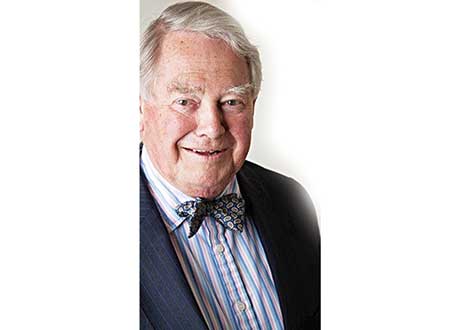
… UNHRC avoids query whether new probe unit can seek those dispatches from Colombo
By Shamindra Ferdinando
Following the UK’s refusal to accede to Sri Lanka’s recent request for disclosing British wartime defence attaché Lt. Col. Gash’s dispatches from Colombo, Conservative member Lord Naseby has sought an explanation as regards the procedures followed by the Defence attachés in gathering and submitting information to Her Majesty’s Government.
Authoritative Sri Lankan government sources told The Island that the UK in spite of being a member of the Geneva-based United Nations Human Rights Council (UNHRC) had taken extraordinary steps to keep Gash dispatches under wraps.
Sources appreciated Lord Naseby’s efforts to unravel the truth in the face of a new high-profile inquiry initiated by the UNHRC.
In response to Sri Lanka’s request made in early March, the UK faulted Gash for not obtaining independent confirmation of reports he had sent to the Foreign, Commonwealth and Development Office (FCDO) during the final phase of the Vanni offensive, only after Sri Lanka sought their release!
Sri Lankan government sources pointed out that the UK never questioned the legitimacy of its defence attaché during the conflict till over a decade after the end of the war.
The following are the questions tabled by Lord Naseby at House of Lords recently: (i) To ask Her Majesty’s Government what criteria they used to assess the credibility of evidence reports they have received which related to the situation in Sri Lanka during the civil war in that country between 1 January and 18 May 2009; and whether it has ever been their practice to accept reports from unnamed sources (ii) To ask Her Majesty’s Government whether the information contained in dispatches written by UK defence attachés must be independently verified before submission; if so, whether it is standard practice to ensure that such attachés are briefed to that effect; and if so, what record, if any, they hold of Lieutenant Colonel Gash, being so briefed (iii) To ask Her Majesty’s Government what sources they used to inform their assessment of the situation in Sri Lanka during the civil war in that country between 1 January and 18 May 2009 and finally (iv) To ask Her Majesty’s Government, further to the dispatches written by Lieutenant Colonel Gash, the former defence attaché of the British High Commission in Sri Lanka about events in that country between 1 January and 18 May 2009 relating to the civil war, whether they consider all reports by UK military attachés and diplomats to be evidence based-assessments.
At the recently concluded 46th session of the UNHRC, the UK in its capacity as Sri Lanka Co-Chair led the offensive for the setting up of special unit at a cost of USD 2.8 mn to probe Sri Lanka accountability issues.
Sri Lanka requested the UK to handover Gash dispatches to the UNHRC in the wake of the proposal to set up a special unit to ‘collect, consolidate, analyze and preserve information and evidence’ in respect of Sri Lanka. The unit is also meant for the development of required strategies to deal with the country in case of gross violations of human rights or serious violations of international humanitarian law.
Meanwhile, The Island on April 06, 2021, having obtained prior sanction submitted the following question in respect of the ‘Oral statement of programme budget implications arising from draft resolution A/HRC/46/L.1/Rev.1 of the Human Rights Council,’: (i) Is there provision for the proposed unit set up to gather evidence, information et al to ask for British HC dispatches from Colombo (January-May 2009) or diplomatic cables from any other UN member state? (ii) What remedial measures Geneva can resort to in case governments decline to cooperate?”
In spite of repeated reminders Geneva didn’t respond to The Island query.
The month-long Geneva sessions ended on March 23, with the 47-member council adopting a fresh accountability resolution with 22 countries voting for, 11 against and 14 abstaining.
“We strongly believe those dispatches from Gash can facilitate Geneva investigations. However, the British, despite repeatedly assuring us of longstanding friendship denied credible information in their possession,” a government source familiar with accountability matters, said.
After Gash’s departure from Colombo, the UK discontinued having a resident Defence Advisor here. Instead, New Delhi-based Defence Advisor looked after matters pertaining to Sri Lanka for nearly a decade. However, in January 2019, the UK re-appointed Colonel David Ashman as their resident Defence Advisor in Colombo.
Sources pointed out that despite Lord Naseby’s disclosure of a section of the Gash reports in Oct 2017, Sri Lanka refrained from requesting examination of the dispatches till March 2021.
Gash countered the primary UN allegation (Panel of Experts’ report issued in March 2011 that the Sri Lankan military massacred 40,000 civilians. Gash estimated the number of deaths at 7,000 to 8,000, including LTTE combatants. His assessment largely tallied with a confidential UN survey (Aug 2008-May 13, 2009) that placed the number of dead at 7,721.
Sources said that the UK had taken contradictory positions as regards Gash dispatches at the hearings at the UK Information Commission following Lord Naseby’s initial bid compel disclosure and when Sri Lanka recently requested for the full disclosure of relevant dispatches. The UK owed an explanation whether those dispatches weren’t made available to POE and the Report of the OHCHR Investigation on Sri Lanka (OISL) also on the grounds they weren’t credible.
News
Gender inequality is not a women’s issue, it is a societal issue that demands attitudinal and behavioural transformation. – Prime Minister
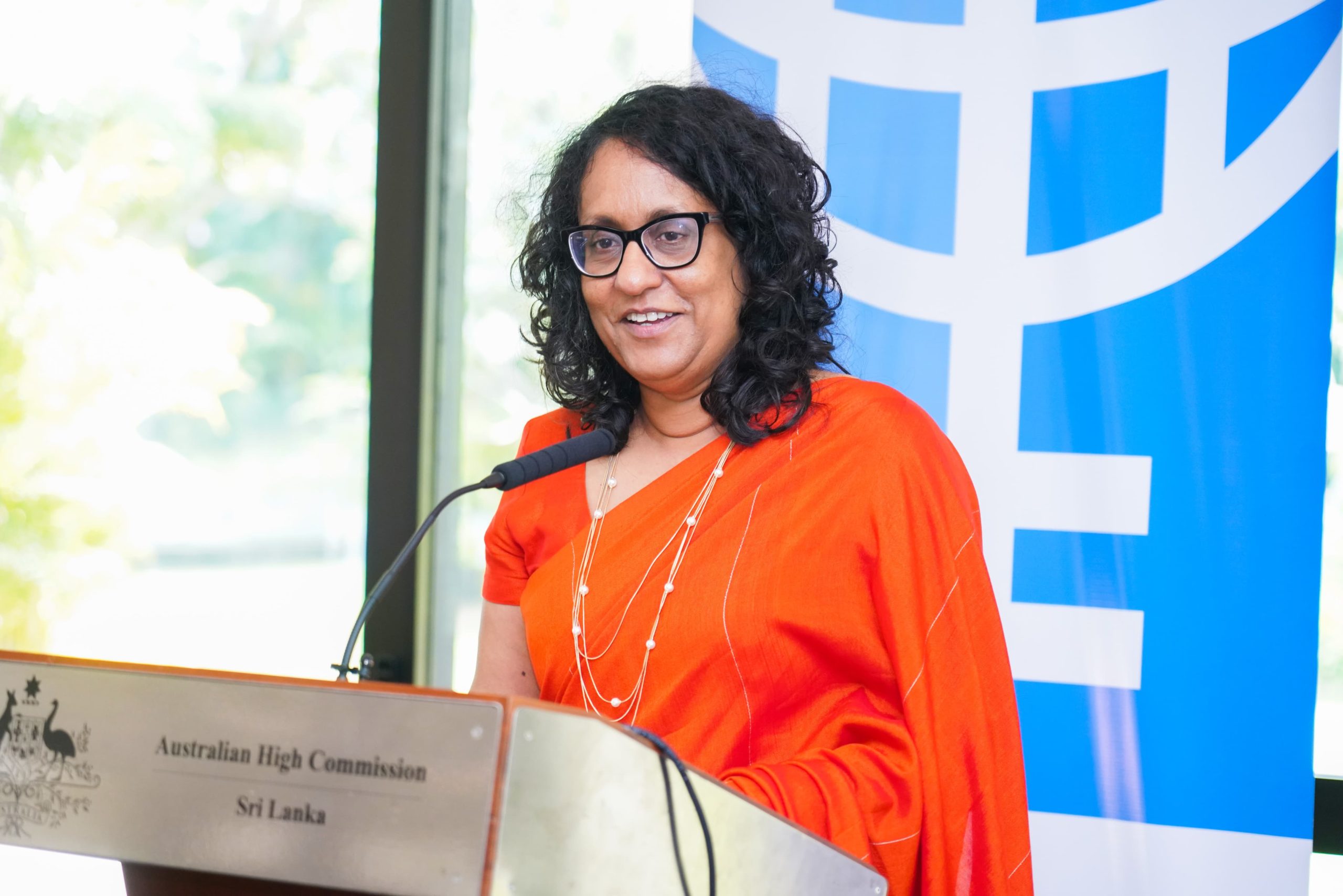
“For countries like Sri Lanka, collaborative efforts like THRIVE are essential in ensuring gender parity and eliminating gender-based violence”
The Prime Minister made these remarks while attending the official launch of ’THRIVE- Together for Her: Resilience-building, Inclusivity, and Voices for Equality in Sri Lanka’, held on Tuesday [25 March] at the Australian High Commission in Colombo which was jointly hosted by the High Commissioner of Australia, UN Women, and Chrysalis.
THRIVE is a five-year initiative implemented by UN Women and Chrysalis, and funded by the Government of Australia. This project contributes to achieving Outcome 6 – “Gender Equality and Women’s Empowerment” – of the UN Sustainable Development Cooperation Framework for Sri Lanka 2023-2027, which has been co-signed by the Government of Sri Lanka and the United Nations, guiding the work of the UN system in Sri Lanka.
The project aims to advance gender equality and women’s empowerment in Sri Lanka by strengthening the economic and social resilience of marginalized women to navigate and recover from crises, insecurity, and the impacts of climate change aiming women with disabilities, women-headed households, and women in the plantation sector across six districts – Mannar, Kilinochchi, Nuwara Eliya, Badulla, Moneragala, and Colombo.
Delivering the keynote address, Prime Minister Amarasuriya emphasized the need for structural and attitudinal change for ensuring gender parity and eliminate violence against women.
“Sri Lanka ranks high on the Human Development Index, with a literacy rate exceeding 92%, and over 60% of university students being women. However, only 35% of women participate in the paid workforce. It is necessary to find ways and means to ensure that women have opportunities to contribute towards the economy through employment opportunities and equal pay with given a dully acknowledge and recognize unpaid work and unpaid care work, which are often disproportionately carried out by women.
The Parliament of Sri Lanka adopted the Women Empowerment Act in 2024 which includes the establishment of an independent National Commission on Women to oversee women’s rights, and to create of a National Fund for Women. The administrative process for appointing the Commissioners is currently underway.
Further, as a government, we have implemented several benefits for women and young women under the national budget. As Minister of Education, I can confidently say that we have allocated funds to ensure children from marginalized communities have access to education including providing free uniforms, shoes, sanitary facilities, meals, books, and a stipend, ensuring that no child drops out due to economic barriers.
However, it is statistically proven that the 90% of women faced sexual harassment in public transport at least once in their lifetime and the Global Gender Gap Index of Sri Lanka lists at 122 among 146 countries that marks gender disparity is not just a women’s issue. It is a societal challenge that transcends gender, race, religion, and age.
Moreover, new threats are emerging. While digital tools offer great potential for development and technological advancement, they are also being misused to silence women, amplify biases, and fuel harassment. It is essential to create an inclusive digital space where everyone—regardless of gender, race, religion, or age—has equal opportunities to thrive in the digital age. The government remains committed to closing the gender digital divide and ensuring that women, especially young women, can participate independently in the digital economy.
Gender inequality is not a women issue, it is a societal issue that demands policy change, education, attitudinal and behavioural transformation. For countries like Sri Lanka, collaborative efforts like THRIVE are essential in creating a future where all women have equal opportunities to thrive.”
The event was attended by the Australian High Commissioner to Sri Lanka, Paul Stephens; UN Women Deputy Regional Director for Asia and the Pacific, Ms. Maria Holtsberg; United Nations Resident Coordinator, . Marc-Andr Franche; and other esteemed dignitaries.
[Prime Minister’s Media Division]
News
Ambassador of the Czech Republic meets Sri Lankan PM to strengthen bilateral relations
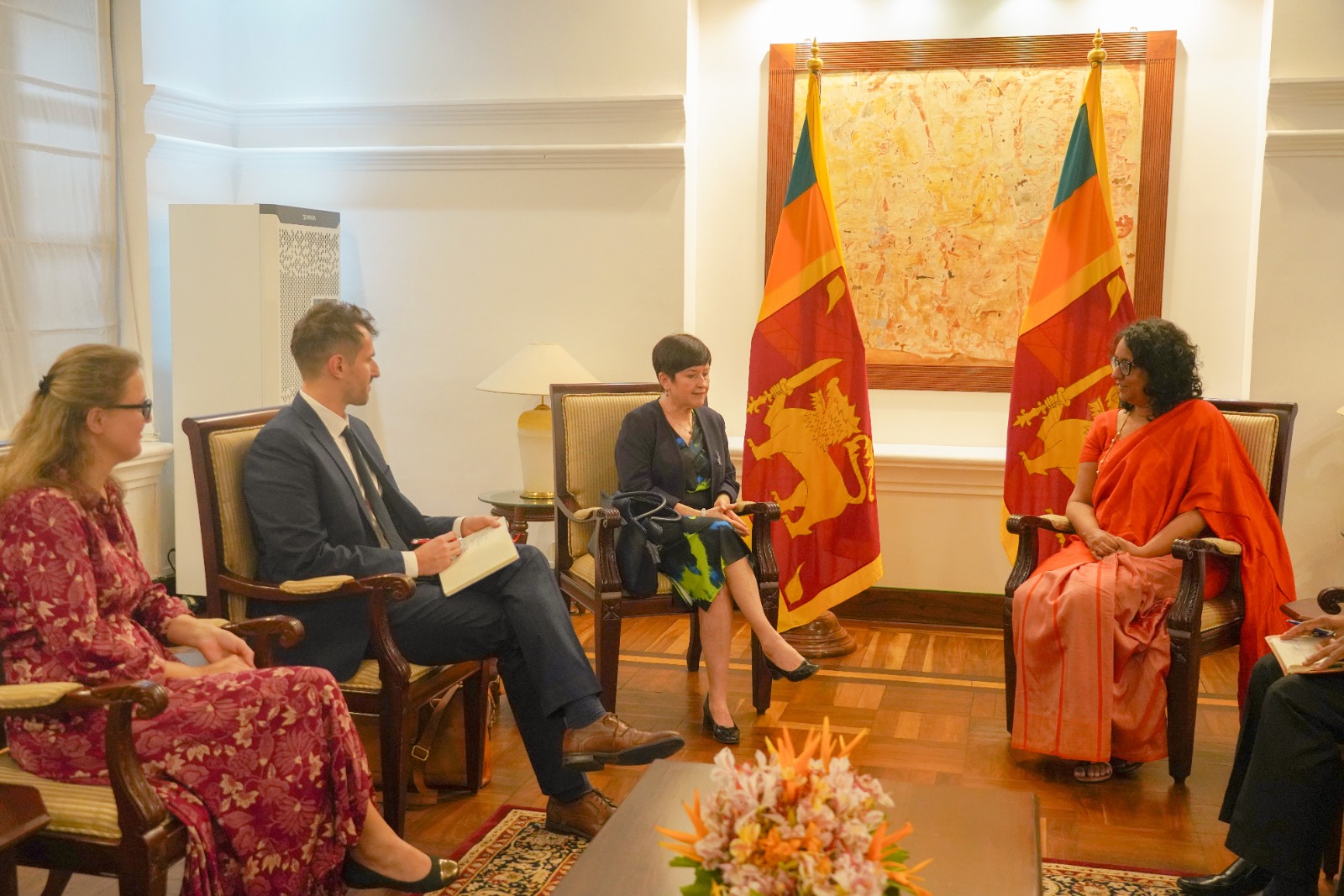
The Ambassador of the Czech Republic to Sri Lanka, Ms. Dr. Eliska Zigova, met with Sri Lanka Prime Minister, Dr. Harini Amarasuriya, at Temple Trees on Tuesday [25th of March]. The meeting underscored the longstanding friendship between the two nations and explored avenues to enhance bilateral cooperation.
Prime Minister Amarasuriya welcomed Ambassador Zigova and acknowledged the Czech Republic’s continued support for Sri Lanka. In response, Ambassador Zigova commended the new government’s commitment to democratic governance and holding two peaceful elections, reflecting political stability and public trust.
Discussions during the meeting focused on strengthening diplomatic and economic ties. Ambassador Zigova emphasized the importance of existing agreements and reiterated her government’s willingness to expand collaboration in key areas. Particular attention was given to discuss the posibility of signing a Memorandum of Understanding (MoU) on science and education, aimed at building academic partnerships, research collaboration, and knowledge exchange between institutions in both countries.
Prime Minister Amarasuriya highlighted the “Clean Sri Lanka Programme,” a nationwide initiative dedicated to environmental conservation and urban sustainability. Additionally, the two dignitaries discussed prospects for enhancing tourism, with the Prime Minister inviting more Czech visitors to experience Sri Lanka’s cultural heritage, natural landscapes, and growing eco-tourism sector.
The meeting was attended by senior officials from the Embassy of the Czech Republic to Sri Lanka. The Sri Lankan delegation included Pradeep Saputhanthri, Secretary to the Prime Minister, and P.R.S.S. Gunaratna, Director General of the Europe & North America Division at the Ministry of Foreign Affairs.
[Prime Minister’s Media Division]
News
Two HC judges withdraw from hearing Krrish case
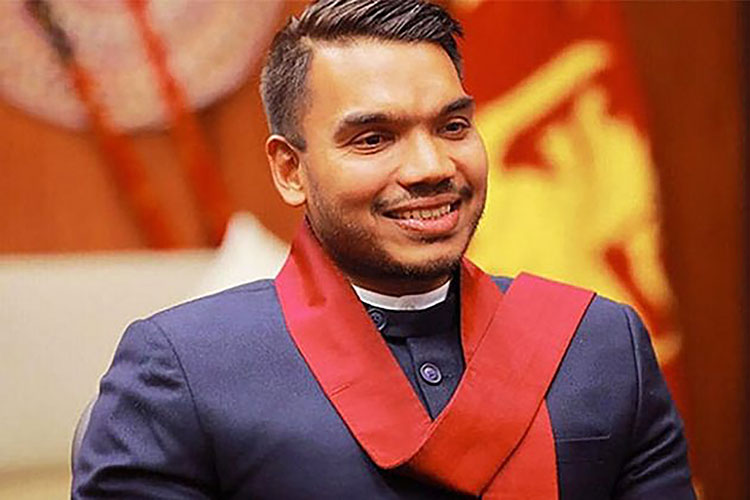
Alleged criminal misappropriation of Rs 70 mn:
Colombo High Court judges Manjula Thilakaratne and Sujeewa Nissanka yesterday (27) withdrew from hearing Krrish case involving SLPP National Organiser Namal Rajapaksa.
The Attorney General in late January this year filed indictments against Rajapaksa. The former minister has been accused of criminal misappropriation of Rs. 70 mn provided by Krrish Group for the development of rugby in Sri Lanka.
HC judge Thilakaratne declared his withdrawal from the case having referred to certain comments directed at him on social media. The judge said that his decision was influenced by comments made by journalists Poddala Jayantha and Sanath Balasuriya.
Subsequently HC judge Sujeewa Nissanka, too, declared his intention to quit.
The case would be called before Colombo Chief High Court Judge Adithya Patabendige on May 21 to name a suitable judge for the case to be referred.
The Krrish deal was first investigated by the yahapalana government.
-

 News5 days ago
News5 days agoSeniors welcome three percent increase in deposit rates
-
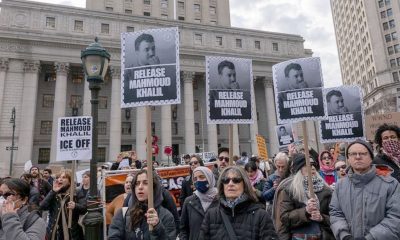
 Features5 days ago
Features5 days agoThe US, Israel, Palestine, and Mahmoud Khalil
-
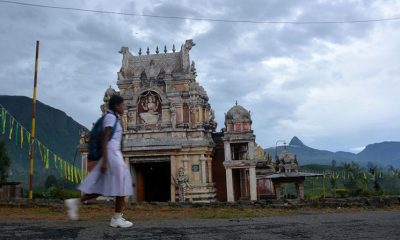
 News5 days ago
News5 days agoScholarships for children of estate workers now open
-
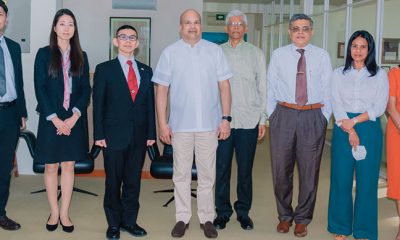
 News6 days ago
News6 days agoDefence Ministry of Japan Delegation visits Pathfinder Foundation
-
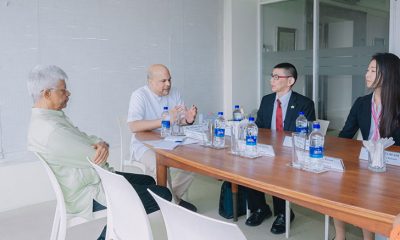
 News5 days ago
News5 days agoJapanese Defence Delegation visits Pathfinder
-
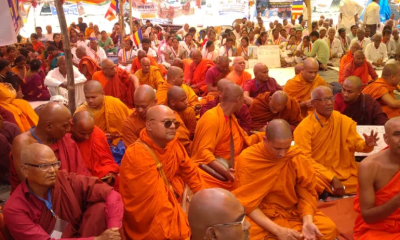
 Foreign News4 days ago
Foreign News4 days agoBuddhism’s holiest site erupts in protests over Hindu ‘control’ of shrine
-

 Editorial6 days ago
Editorial6 days agoWhen promises boomerang
-
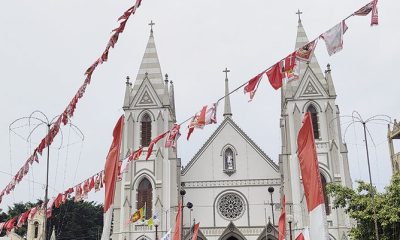
 News6 days ago
News6 days agoBan on altar girls upsets nuns, stirs talk on women’s church roles











